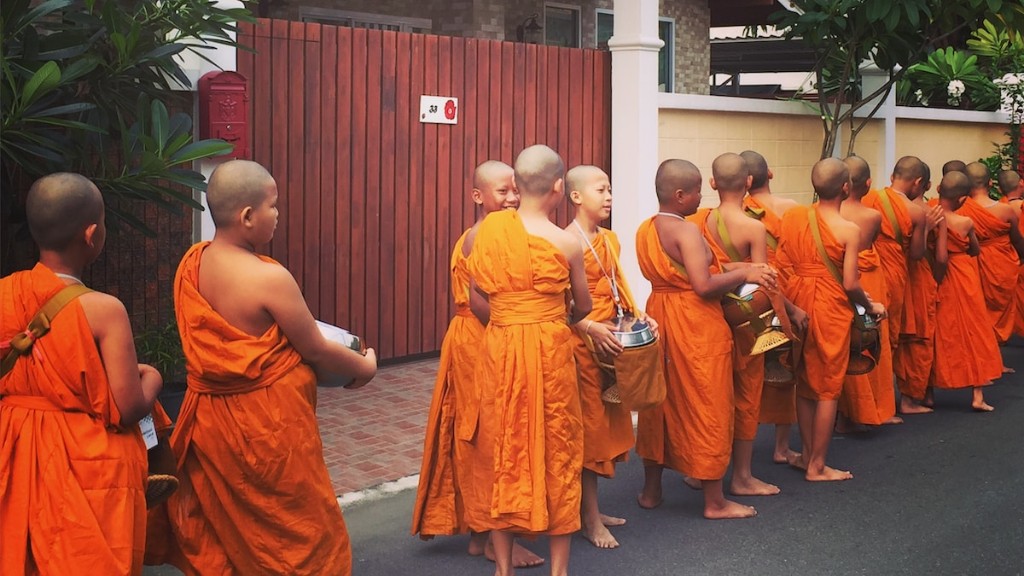Ahimsa is a central principle in Hinduism and means non-violence or non-harming. Ahimsa’s ultimate goal is to bring an end to the cycle of violence and suffering that exists in society. It is founded on the belief that all life is interconnected and deeply sacred. Hindus recognize that every single soul is part of the divine, and hurting another is ultimately hurting an aspect of oneself. This extends to all living creatures, including animals, plants, and insects. Ahimsa is one of the Yamas (Section called five-limbs of yoga), which are a list of universal moral qualities, described by Patanjali in his Yoga Sutras. In addition to Ahimsa, the other four yamas are Satya (truthfulness), asteya (non-stealing), brahmacharya (non-excess) and aparigraha (non-posessiveness). Ahimsa is an intrinsic part of being a Hindu and should be practiced with an open heart and positive intention.
Some Hindus live an entirely compassionate lifestyle that follows Ahimsa from sunrise to sunset, not eating any meat and taking part in vegan practices, or Jainism. The Jains live by the principle of absolute non-violence and strict vegetarianism. Additionally, this kind of lifestyle is often seen to be deeply spiritual, as it eliminates feelings of guilt and regret.
For other Hindus, Ahimsa may take a more practical form such as refraining from harming others through words and deeds. It is a way of being kind and generous to others, acknowledging that everyone is connected and deeply valued. True Ahimsa requires us to have humility and an understanding that all souls are part of the divine, therefore it should be met with compassion and understanding.
In practice, Ahimsa applies to the larger degree of not causing any form of harm. This includes refraining from gossip and speaking in harsh tones. It guides us to be mindful of our words and our actions towards others and strive to be gentle and kind in every way. We are encouraged to live in a way that does not place ourselves or others in danger or harm any living being.
But Ahimsa does not just mean to not be violent, it also aims to remove the causes of violence. This involves taking action to bring about long-term peace and harmony in our lives, such as social and economic justice. This can be achieved by fighting against poverty, inequality, and injustice. Ahimsa encourages us to be a peaceful force of change in the world and work to create a better future for everyone.
Karma & Ahimsa
Ahimsa and karma are closely linked, as karma implies that we are responsible for our actions and their consequences. Hinduism teaches that we live in a cycle of cause and effect and that any actions we take will have an effect in one way or another. The principle of Ahimsa encourages us to be aware of our actions and to refrain from doing any harm as it will always come back to us one way or another. This ties in with the idea of what goes around comes around, which implies that all of our actions, good or bad, will always have consequences.
Karma ensures that any action taken will have an effect on us in some way, either directly or indirectly. Therefore if we practice Ahimsa, we will receive the benefits of peace and harmony, both in our individual lives and within society as a whole. In terms of karmic consequences, practicing Ahimsa will bring us greater joy and contentment as opposed to causing harm and suffering.
It is important to remember that Ahimsa means more than just not harming another. Even if we do not directly harm someone else, we should refrain from doing anything that could potentially harm them in the future. This could be anything from gossiping about someone to spreading false rumors or taking advantage of power dynamics. All of these actions will inevitably have long term consequences that can be karmically painful. Therefore, Ahimsa applies to more than just physical violence, but to our thoughts and emotions as well.
Acts of Ahimsa
Ahimsa is not just a moral principle but is a way of life. It requires conscious action and the intention to bring peace and harmony into the world. We can practice Ahimsa in our day-to-day life by being kind to those around us, treating everyone with respect, and being aware of the potential consequences of our words and deeds. Every action we take, every thought we have, should be motivated by the intention to do no harm. This includes speaking kindly to those around us, being generous with our time, and being mindful of the environment.
In addition to this, being mindful of our consumer choices is another way to practice Ahimsa. Refraining from buying products that have been made with the exploitation of humans or animals will ensure that we are not causing any form of harm. Furthermore, being aware of the effects our lifestyle has on the environment and opting for sustainable options when possible is another way to practice Ahimsa. All of these acts will make a positive contribution towards keeping our beautiful world safe.
The practice of Ahimsa also includes self-love and self-care. It is important to understand that we should treat our own body and soul with a kind and loving attitude. This means being gentle and kind to ourselves, not engaging in any self-destructive behavior, and looking after our own health and well-being. Practicing self-compassion will lead to a deep sense of contentment and self-love.
Breaking The Cycle of Penalty & Revenge
Ahimsa encourages us to break the cycle of violence and suffering, by replacing it with compassion and understanding. We are urged to let go of any need to retaliate or seek revenge, recognize that all souls are interconnected, and become a force for peace in the world. Ahimsa appeals to our highest qualities and encourages us to lead lives of kindness, generosity, and understanding.
Ahimsa has the power to change our relationships with others and transform our lives. It can help us to become more tolerant and less judgmental, as we learn to accept that everyone has their own unique journey and struggles. When we practice Ahimsa, we are actively increasing our empathy and understanding and respecting the dignity of all living creatures.
We are encouraged to take the time to think before we act, be mindful of our words and actions, and strive for peace and harmony both in our own life and in the world around us. Ahimsa provides us with an opportunity to become agents of positive change, to be a source of kindness and compassion, and to create a lasting legacy of peace and understanding.
Jainism & Ahimsa
Ahimsa is a cornerstone of Jainism and its adherents strive to lead an entirely compassionate lifestyle. Unlike Hinduism, Jainism emphasizes complete non-violence, even to the point of refraining from eating or wearing anything of animal origin. Additionally, they believe in the sanctity of all life, regardless of whether it is human or animal, and practice strict vegetarianism.
Jainism not only teaches a philosophy of non-violence but also emphasizes the importance of actively working towards peace and harmony. This includes striving to create a just and equitable society, working for social change, and fighting against injustice and oppression. Additionally, Jainism urges its adherents to be mindful of their actions, words and thoughts, and practice self-restraint.
Through its teachings and practices, Jainism aims to break the cycle of violence and suffering and create a peaceful and equitable society. Thus Jains are encouraged to practice Ahimsa in all aspects of their life, not just in terms of physical violence but by promoting peace, harmony and justice to all.
Ahimsa & Engagement
Ahimsa encourages us to actively engage in the process of creating a peaceful and compassionate world and encourages us to become a force for good. It asks us to look beyond our own self-interest and become conscious of our actions and their potential effects on others. We can practice Ahimsa by actively seeking justice for those marginalized and oppressed and becoming involved in social and economic development projects that benefit all living creatures.
Ahimsa also asks us to look within and cultivate an attitude of self-love and self-compassion. This means becoming aware of our own guilt, fears, and insecurities and working to create harmony between ourselves and the external world. This can be achieved through cultivating greater self-awareness, engaging in meaningful conversations, and being mindful of our thoughts and deeds.
Furthermore, Ahimsa encourages us to become aware of the interconnectedness of all beings. This means that we should strive to create a world in which all living creatures are respected and treated with dignity and kindness. This can be achieved through conscious action, by engaging in meaningful dialogue and actively working to create a more just, equitable and compassionate society.
Meaning of Ahimsa
Ahimsa is an important principle in Hinduism and is one of the five Yamas outlined by Patanjali in his Yoga Sutras. It encourages us to live with a compassionate heart and an understanding that all life is interconnected and deeply sacred. Ahimsa should be practiced with positive intention, kindness and humility and entails refraining from harming others, either through words or deeds. This includes refraining from gossip, violent words and actions, and unjust actions.
Furthermore, Ahimsa does not just refer to physical violence or harm, it also urges us to become advocates for peace and justice and to create a more equitable society. This involves actively seeking out ways to help those who are oppressed, fighting unjust social practices and striving to create a world of peace and harmony. It also involves becoming aware of our own thoughts and actions and practicing self-compassion and self-love.
Ahimsa can be practiced in many ways throughout our lives, from our diet to our consumer choices and our relationships with others. It is an integral part of being a Hindu and should be treasured and respected. We can all make a conscious effort to practice Ahimsa in our day-to-day lives and create a future of peace and understanding.


